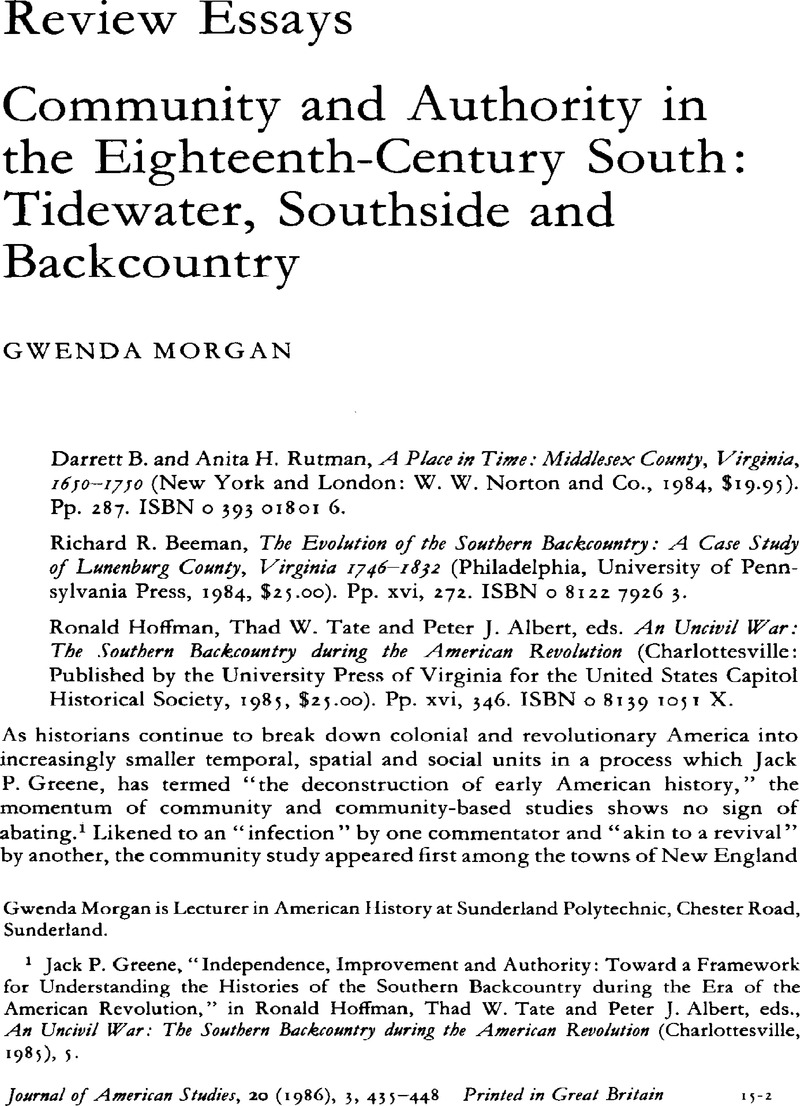No CrossRef data available.
Article contents
Community and Authority in the Eighteenth-Century South: Tidewater, Southside and Backcountry
Published online by Cambridge University Press: 16 January 2009
Abstract

- Type
- Review Essays
- Information
- Copyright
- Copyright © Cambridge University Press 1986
References
1 Greene, Jack P., “Independence, Improvement and Authority: Toward a Framework for Understanding the Histories of the Southern Backcountry during the Era of the American Revolution,” in Hoffman, Ronald, Tate, Thad W. and Albert, Peter J., eds., An Uncivil War: The Southern Backcountry during the American Revolution (Charlottesville, 1985), 5Google Scholar.
2 Nash, Gary B., “Social Development” in Greene, Jack P. and Pole, J. R., eds., Colonial British America: Essays in the New History of the Early Modern Era (Baltimore, 1984), 233–34Google Scholar; Waters, John J., “Patrimony, Succession and Social Stability: Guilford, Connecticut in the Eighteenth Century,” Perspectives in American History, 10 (1976), 131Google Scholar. For the most recent comment on these developments, see Rutman, Darrett B., “Assessing the Little Communities of Early America,” William and Mary Quarterly, 3rd ser., 43 (1986), 163–78CrossRefGoogle Scholar.
3 Hoffman, Ronald, “The ‘Disaffected’ in the Revolutionary South,” in Young, Alfred F., ed., The American Revolution: Explorations in the History of American Radicalism (DeKalb, Ill., 1976), 273–316Google Scholar.
4 Demos, John, A Little Commonwealth: Family Life in Plymouth Colony (New York, 1970)Google Scholar; Greven, Philip J. Jr, Four Generations: Population, Land and Family in Colonial Andover, Massachusetts (Ithaca, 1970)Google Scholar; Lockridge, Kenneth A., A New England Town: The First Hundred Years: Dedham, Massachusetts, 1636–1736 (New York, 1970)Google Scholar; Zuckerman, Michael, Peaceable Kingdoms: New England Towns in the Eighteenth Century (New York, 1970)Google Scholar.
5 Bruce, Philip A., Economic History of Virginia in the Seventeenth Century (2 vols., New York, 1896)Google Scholar; Bruce, , Institutional History of Virginia in the Seventeenth Century (2 vols., New York, 1910)Google Scholar. Two notable exceptions to this statement were Ames, Susie M., Studies of the Virginia Eastern Shore in the Seventeenth Century (New York, 1940)Google Scholar, and Brown, Robert E. and Brown, B. Katherine, Virginia 1705–1786: Democracy or Aristocracy? (East Lansing, 1964)Google Scholar.
6 Russell, R. Menard, “From Servants to Slaves: The Transformation of the Chesapeake Labor System,” Southern Studies, 16 (1977), 355–90Google Scholar.
7 Braudel, Fernand, The Mediterranean and the Mediterranean World in the Age of Philip II (2 vols., New York, 1972), 11, 16, 20–21Google Scholar.
8 Nash, “Social Development,” 234.
9 Main, Gloria L., Tobacco Colony: Life in Early Maryland, 1650–1720 (Princeton, 1983), 123–39Google Scholar.
10 Roeber, A. G., Faithful Magistrates and Republican Lawyers: Creators of Virginia Legal Culture, 1680–1810 (Chapel Hill, 1981), 74Google Scholar; Roeber, , “Authority, Law and Custom: The Rituals of Court Day in Tidewater Virginia,” William and Mary Quarterly 3rd sec., 37 (1980), 31–32CrossRefGoogle Scholar.
11 Hening, W. W., ed., Statutes at Large: Being a Collection of All the Laws of Virginia from the First Session of the Year 1619 (13 vols., Richmond and Philadelphia, 1809–1823), 3, 102–3Google Scholar.
12 Morgan, Gwenda, “The Hegemony of the Law: Richmond County, 1692–1776,” Ph.D. diss. The Johns Hopkins University, 1980, 97–110Google Scholar.
13 Cash, Wilbur J., The Mind of the South (New York, 1941)Google Scholar; Morgan, Edmund S., American Slavery, American Freedom: The Ordeal of Colonial Virginia (New York, 1975)Google Scholar
14 Ekirch, A. Roger, “Poor Carolina,” Politics and Society in Colonial North Carolina, 1729–1776 (Chapel Hill, 1981)Google Scholar; Ekirch, , “The North Carolina Regulators on Liberty and Corruption, 1766–1771,” Perspectives in American History, 11 (1977–1978), 199–256Google Scholar; Michael Kay, Marvin L., “The North Carolina Regulation, 1766–1776: A Class Conflict,” in Young, , ed., The American Revolution, 71–123Google Scholar; Wittenburg, James P., “Planters, Merchants and Lawyers: Social Change and the Origins of the North Carolina Regulation,” William and Mary Quarterly, 3rd ser., 34 (1977), 215–38CrossRefGoogle Scholar.
15 Maier, Pauline S., “The Charleston Mob and the Evolution of Popular Politics in Revolutionary South Carolina 1765–1784,” Perspectives in American History, 4 (1970), 173–98Google Scholar.
16 Braudel, , The Mediterranean, 1, 20–21Google Scholar.
17 Hillery, George A. Jr, “Definitions of Community: Areas of Agreement,” Rural Sociology, 20 (1955), 111–23Google Scholar.
18 Calhoun, C. J., “History, Anthropology and the Study of Communities; Some Problems in Macfarlane's Proposal,” Social History, 3 (1978), 363–73CrossRefGoogle Scholar; Calhoun, , “Community: Towards a Variable Conceptualization for Comparative Research,” Social History, 5 (1980), 105–29CrossRefGoogle Scholar; Fox-Genovese, Elizabeth and Genovese, Eugene D., “The Political Crisis of Social History,” Journal of Social History, 10 (1976), 205–20CrossRefGoogle Scholar; Macfarlane, Alan, “History, Anthropology and the Study of Communities,” Social History, 5 (1977), 631–52CrossRefGoogle Scholar; Rutman, “Assessing the Little Communities of Early America,” 163–78.




